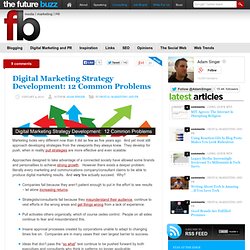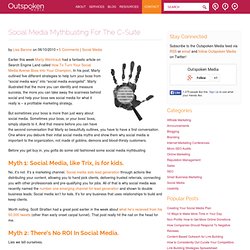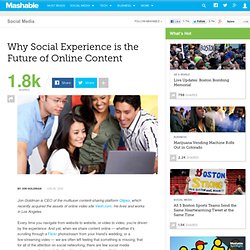

Digital Marketing Strategy Development: 12 Common Problems. Marketing looks very different now than it did as few as five years ago.

And yet most still approach developing strategies from the viewpoints they always knew. They develop for push, when in reality pull strategies are more effective and even scalable. Approaches designed to take advantage of a connected society have allowed some brands and personalities to achieve strong growth. However there exists a deeper problem: literally every marketing and communications company/consultant claims to be able to produce digital marketing results. And very few actually succeed. Companies fail because they aren’t patient enough to put in the effort to see results – let alone increasing returns.Strategists/consultants fail because they misunderstand their audience, continue to vest efforts in the wrong areas and get things wrong from a lack of experience.Pull activates others organically, which of course cedes control.
OK – those are pretty general. 1. 10 Proven Strategies for Greater Likeability on Facebook. Dave Kerpen is the CEO of Likeable, a social media agency that has worked with more than 200 leading brands including 1-800Flowers.com, Verizon and Neutrogena.

You're boring. The CMO's Guide To The Social Media Landscape. The Glass Ceiling, the Inner Circle, and the Key to Building a Popular Blog. How to Be Interesting. How Converse Became the Biggest Little Sneaker Brand on Facebook. Converse doesn't have a huge advertising budget, but, judging by its social media fan base, it doesn't seem to need one. Converse now has more than 15 million fans on Facebook, which is almost four times the number for its parent company, Nike and about eight times as many as Adidas.
Social Media Mythbusting For The C-Suite. Earlier this week Marty Weintraub had a fantastic article on Search Engine Land called How To Turn Your Social Media Averse Boss Into Your Champion.

How Social Media is Changing the Way Government Does Business. Steve Radick is a communications consultant with Booz Allen Hamilton, a global technology and strategy consulting firm.

He has worked with clients from across the U.S. government to develop and implement strategic communications plans and campaigns. The Silly Putty age of social media. For something that seems very rudimentary in a world of iPhone apps and fancy smartphone operating systems, text-messaging services were getting a whole lot of love at October's edition of the monthly New York Tech Meetup.

Along with about a dozen other start-ups eager to pitch the audience of potential partners, investors, and advisers, two back-to-back presentations from new companies called GroupMe and Fast Society showed off different takes on the same basic concept of group text messaging. They have extremely similar premises. Both GroupMe and Fast Society require a single user with an iPhone (or also, in GroupMe's case, a browser connection) to kick-start a group and invite people by phone number so that they can text away. GroupMe assigns that group a unique phone number; Fast Society uses a single short code for text messages, mandating that each user can only participate in a single "team" at a time.
It gets even more specific. Why Social Experience is the Future of Online Content. Jon Goldman is CEO of the multiuser content-sharing platform Qlipso, which recently acquired the assets of online video site Veoh.com.

He lives and works in Los Angeles. The 7 Deadly Sins of Blogging. Why Relevance Trumps Influence in Every Type of Media (Not Just Social) Despite so much noise about how social media has radically changed the rules of PR and marketing, the fascination with social media influencers is proof of a persistent desire in our industry to take the same old shotgun approach to publicity and dress it up in a new media veneer.

In the influencer game, everyone with high enough readership, or an audience large enough to be considered influential gets pitched for campaigns without a lot of thought to whether the message they’re asking these influencers to deliver is relevant to those in his/her network. Even Virgin America is jumping on the social media influencer bandwagon with free tickets to what it considers influential Twitter users. Doesn’t this dance sound familiar? Simply pitch everyone with a soapbox tall enough to carry your message to their audience? Stop Schmoozing and Find People Who Actually Care.
The Future of Public Relations and Social Media. This series is supported by Gist.

Gist provides a full view of the contacts in your professional network by creating a rich business profile for each one that includes the most news, status updates, and work details. See how it works here. Public relations specialists were some of the first people to embrace the power of social media, and as a result they are often the ones leading the way in the social space, whether they are consulting with clients from an agency point of view or strategizing on an in-house PR team.
In the past decade, the Internet has had a huge impact on how PR professionals function. As of late, social media is changing the face of PR, as well. The Future of the Press Release The first press release was created during the fall of 1906 by Ivy Lee, known by some as the founder of modern public relations. 10 Reasons You Should Run Like Hell From Social Media. Don’t be that guy. We hear the phrase, “don’t be that guy,” a lot in social media circles, but there are a lot of those guys still running around trying to shout their message in an endless game of virtual whack-a-mole every time something pops up on their news alerts, in a blog post or Twitter stream when it seems relevant to what they are promoting and/or selling.

Rather than actually listening, they rush to the scene to promote and/or contradict statements they feel run counter to their messaging. They leave comments on everyone’s blog – often rehashed statements that read eerily similar to other comments left elsewhere. Thinly veiled comments that seem designed to deliver a pitch. Stop it. 3 Traits of the Most Compelling Internet Companies. Alex Taussig is a principal at Highland Capital Partners, where he invests in early stage technology companies.

He blogs frequently at infinitetoventure, and you can find him on Twitter at @ataussig. I probably spend too much time on the Internet. And because I work in venture capital, I get to see Internet products in their rawest form. The primordial ooze of a consumer Internet product can be a beautiful thing. With the window dressing stripped away, one can often see the core aspects of what will make that product successful. Here are three key characteristics of those that often do become a success. 1.
I didn’t think Facebook was a big deal — that is, until photos became more prominent. All Marketers Are Liars by Seth Godin: Do you have a Home Depot problem? This is what it looks like as you walk through the parking lot to my Home Depot in Yonkers, New York. No, it's not a nightclub. It's a hardware store. Home Depot has a challenge. They're not growing the way they want to. Huge discounts were enough to completely disrupt the local market, wiping out many mom and pop competitors. All Marketers Are Liars by Seth Godin: All (successful) politicians are liars.
And that's because citizens demand that they lie. And we're getting what we deserve. I listened to a debate on the radio yesterday between David Keene, chairman of the American Conservative Union and Ralph Neas, president of People for the American Way.